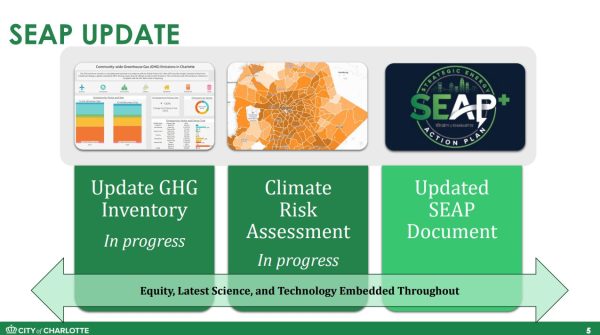City of Charlotte begins work on strategic energy action plan 2.0

In 2018 the City of Charlotte adopted the Strategic Energy Action Plan, an ambitious climate action plan with two timebound goals. First, for the City’s vehicle fleets and buildings to be powered by net-zero emissions sources by 2030. Second, for Charlotte to become a low-carbon city by lowering per capita emissions from 12 to 2 CO2 equivalents per person/year. (Check out this previous blog post to learn more about how Sustain Charlotte and other organizations advocated for the SEAP’s adoption and implementation.)
At the October Transportation, Planning & Development committee meeting, Dr. Robyn Byers and Sarah Hazel presented an update on the progress toward achieving the SEAP’s goals and outlined what’s next. Staff are reviewing the latest climate and energy science as they work to align the SEAP with the City’s other adopted plans and policies.
The goal is to update the SEAP and adopt it as “SEAP+”.
Where are we now?
The City is finalizing a Greenhouse Gas (GHG) Emissions Inventory, finalizing a Climate Risk Assessment, updating goals, reviewing action areas and tasks, identifying milestones, and preparing for public engagement.
After so many people were caught off guard by the devastation in western NC that was exacerbated by climate change, the question of Charlotte’s vulnerability is top of mind for many residents. The Climate Risk Assessment has identified that the highest climate risks for Charlotte are extreme heat, precipitation, severe thunderstorms, and urban flooding
What’s next?
Public engagement is already happening and will use a variety of methods: virtual and in-person representations at Community Area Planning meetings, a SEAP awareness survey, Technical Advisory Committee, newsletter, and pop-up events.
The City will continue to determine how to best implement the SEAP and align funding needs with its goals. These next steps have been identified:
- Finalize GHG Emissions Inventory and Climate Risk Analysis.
- Identify and/or confirm Action Areas and associated tasks.
- Identify and update goals with associated interim milestones
- Review and adoption of SEAP+.
Get involved!
- Take the survey: https://publicinput.com/charlotteseap
- Mark your calendar for the kick off meeting on Thursday, November 21 from 5:30 to 7:30 p.m.
Thanks for reading!
As a nonprofit, community support is essential for us to keep doing what we do — including providing free articles like this. If you found this article helpful, please consider supporting Sustain Charlotte.
Want to stay in the loop? Subscribe to our weekly newsletter and follow us on Instagram, Facebook, and X.
